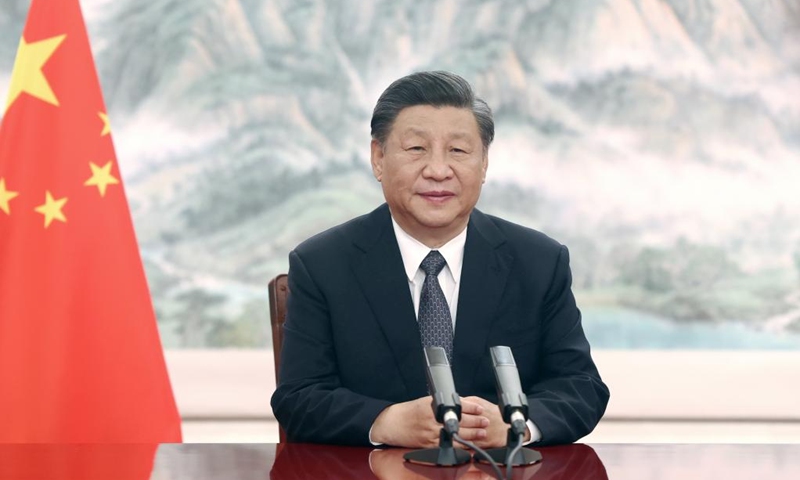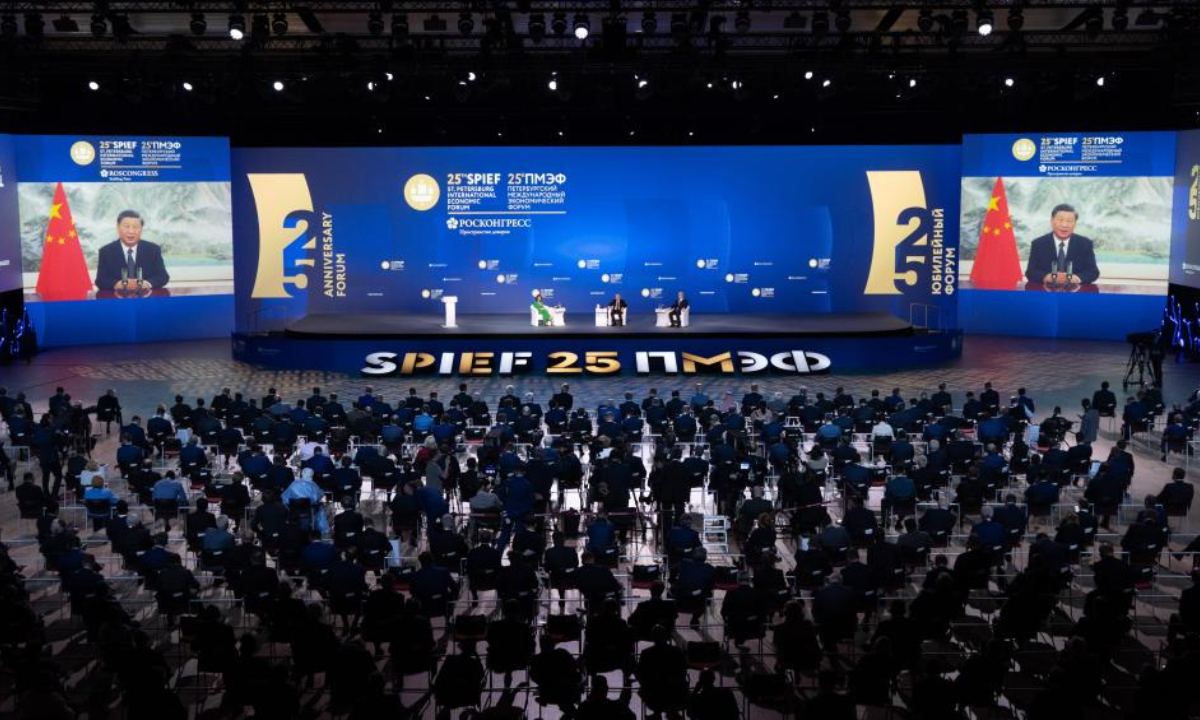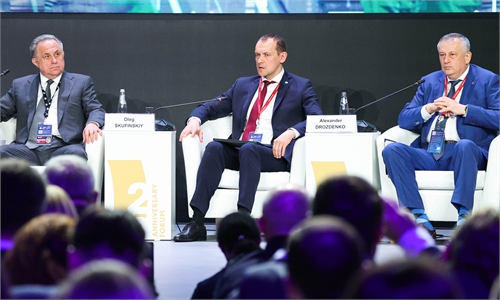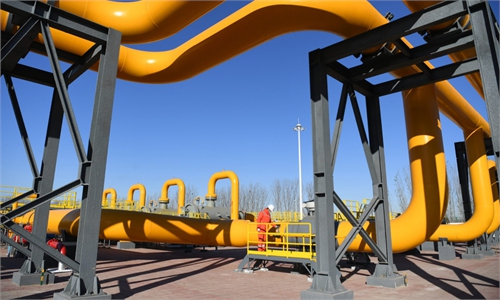Xi stresses true multilateralism, rejecting decoupling and sanctions at Russian economic forum

Chinese President Xi Jinping attends and addresses the plenary session of the 25th St. Petersburg International Economic Forum in virtual format upon invitation, June 17, 2022.(Photo: Xinhua)
By stressing the need to foster an enabling environment for development, Chinese President Xi Jinping pointed out the importance to follow true multilateralism, build an open world economy and reject attempts at decoupling, supply disruption, unilateral sanctions and maximum pressure in a speech at the 25th St. Petersburg International Economic Forum (SPIEF) via video link on Friday.
The world is faced with major changes and a pandemic both unseen in a century, economic globalization is facing headwinds, and there are unprecedented challenges to the implementation of the UN's 2030 Agenda for Sustainable Development, Xi said as he attended the forum upon invitation.
Analysts said Xi's remarks show strong support for fair and multilateral approach and economic connectivity, when this year's forum is the first since Russia was put under numerous Western sanctions since the Ukraine crisis.
We need to advance economic globalization. It is important that we strengthen "soft connectivity" of development policies and international rules and standards, reject attempts at decoupling, supply disruption, unilateral sanctions and maximum pressure, remove trade barriers, keep global industrial and supply chains stable, tackle the worsening food and energy crises, and revive the world economy, said Xi.
This year's SPIEF, hailed as the "Russian Davos," began on Wednesday and a key focus of the forum is responding to the challenge of the times by addressing issues of economic recovery and international cooperation within multilateral cooperation mechanisms, including BRICS. China and Russia's key participation have sent a strong signal on international and regional affairs, analysts said.
When talking about China's economy, Xi noted that the fundamentals of the Chinese economy - its resilience, enormous potential, and long-term sustainability - remain unchanged and will continue to promote high-quality development.
China stands ready to work with Russia and all other countries to explore development prospects, share growth opportunities, and make new contributions to deepening global development cooperation and building a community with a shared future for mankind, said Xi.

Chinese President Xi Jinping attends and addresses the plenary session of the 25th St. Petersburg International Economic Forum in virtual format upon invitation, June 17, 2022. Photo:Xinhua
Yang Jin, an expert at the Institute of Russian, Eastern European, and Central Asian Studies under the Chinese Academy of Social Sciences, told the Global Times that Xi stressed the significance of an open and inclusive world economic order and win-win cooperation, instead of zero-sum game, decoupling and weaponizing sanctions pursued by the US-led alliances.
Xi's address was one of the achievements in strengthening China-Russia economic cooperation even if the West is pressuring China to join their sanctions against Russia. However, Yang stressed that the enhanced economic ties between China and Russia are out of the interests of the two countries as well as the need to realize a fairer and safer global development through multilateralism, which cannot be interpreted as China taking sides in the Russia-Ukraine conflict.
Following the Russia-Ukraine crisis, the US and the West have imposed multiple rounds of sanctions and some experts said that more unilateral sanctions in pushing for a new Cold War and dividing the world's economy have not only prompted Russia to "seek a way out" but also deeply hurt globalization.
On Friday, while addressing the SPIEF, Russian President Vladimir Putin said that sanctions against Russia were a double-edged sword and would only harm the West and he noted that the EU will lose $400 billion for imposing the sanctions on Russia.
Putin also stressed that Russia is not going to close doors and will continue its course to openness and wide economic cooperation.
At this year's SPIEF, Russia-China cooperation has drawn more attention as Kremlin's interests appeared to shift toward the East in the face of mounting Western sanctions and pressure, analysts said.
Chinese and Russian companies have reached agreements on key industries such as energy, food and other daily commodities on the sidelines of SPIEF.
For example, China National Petroleum Corporation deputy general manager Huang Yongzhang held a video talk on Thursday with the vice president of Russia's Gazprom, during which they signed a technical agreement on a Russia-China Far East Gas Supply project to strengthen energy cooperation, a move that experts said would be a further expansion of Russian energy supplies to China.
The "Power of Siberia 1" natural gas pipeline was opened between China and Russia as early as December 2019, with a gas transmission capacity upgraded to 53 billion cubic meters in 2021.
The strengthening of the gas trade between China and Russia is to further diversify the sources of supplies instead of too much reliance on any particular source, experts said.
In addition to the signing of energy cooperation, Chinese and Russian companies also signed a number of memorandums of cooperation involving trade in food and other daily necessities as both sides seek to unleash the potential in the cross-border supply chain.
"Russia is facing the narrowing of westbound cooperation, and China and Russia will need a huge space for improvement in the field of transportation and logistics, including the further improvement in the capacity of the China-Europe freight trains," Li Ziguo, a senior research fellow with the China Institute of International Studies, told the Global Times.
Analysts noted that as Russia actively seeks to break the Western siege in currency settlements, logistics and trade, Chinese companies can "fill the vacancy" and China's investment in Russia will also expand at a fast pace.
Moreover, Russia and China's economic cooperation will also help boost multilateralism and globalization and promote regional development and stability, analysts said.


